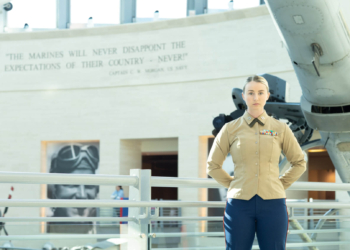Preparedness and readiness are words that get tossed around a lot in military communities. Service members spend plenty of time away from home with drills, field exercises or deployments. In turn, spouses learn to spend a lot of time alone not excluding foreign military spouses.
The challenge this poses means that for U.S. military spouses, strong organizational support is a key to success. Family readiness groups, spouse socials, play groups and other events help military spouses work with the resources they have available and often make the best out of trying situations. Foreign military spouses often share in these same challenges, though the resources they have available might be vastly different.
Here’s a look at two very different realities.
The Albanian army

Henrietta Sulaj is a gleeful 65-year-old retiree who loves going to her local YMCA. She’s been living in the U.S. for the last 20 years after emigrating from Albania with her husband. Jev, 71, is a retired field artillery officer.
For Sulaj, life as a military spouse came with no more accolades than life for the average Albanian during that time. Nestled between Italy and Greece, this small country was under communist rule from 1946 to 1992.
“Military families did not have any special help or treatment compared to civilian families,” she said.
Her family of four lived in a small apartment for four years that they shared with another military family of four. This meant that everything she and her family needed was carefully orchestrated and planned. When her children were young, this was pretty tough.
“We didn’t know them at all. In fact, we had the living room to ourselves and the other family had the two bedrooms. The bathroom was shared.”
This reality seems almost impossible to comprehend, but it was the norm for Sulaj. In a country so closed that most citizens didn’t know the Berlin Wall no longer existed, Sulaj often struggled to meet the basic needs of life.
“Every day, I was alone with two small children. I would wake early and prepare the kids and myself for the day and leave the house with one small child in my arms, holding the other by the hand. We would walk thirty minutes in the middle of the rain, cold wind or the heat,” she said.
Over the nine installation moves with housing sometimes as far as 75 miles away, Sulaj recalls transportation always being an issue. Because the government prohibited the ownership of vehicles, Sulaj and the rest of the country would get to where they needed to go by hitchhiking.
“Transportation was always difficult. Either we went by foot or we found a ride. It was always very tiring.”
Unlike the military spouses of today, Sulaj didn’t have any appliances on which to lean to make her life a little less arduous.
“I would do all the [household] chores in sequence and with great speed. I would take care of the kids, cook and do the laundry.”
Doing the laundry by hand with a varying availability of water wasn’t just her only challenge. Without tumble dryers, everything had to be line-dried in the sun.
“Everything you needed or wanted, you had to do yourself,” she said.
The Royal Air Force

Clare McNaughton is a writer, mother and British military spouse. Two decades of marriage to a Royal Air Force squadron leader has taught her a thing or two about advance planning. Her husband, Kai, has served for almost 30 years.
McNaughton is something of a celebrity within the British military spouse community. She has published books relating to her experience, runs a blog and is often a keynote speaker at military spouse functions to discuss her experiences. With a mixed perception of the military in the U.K., McNaughton is certain that the general population really doesn’t understand the reality of military life.
“It’s a bit of an enigma. It’s either put on a pedestal or help with contempt,” she said.
Like Sulaj’s experience with the Albanian army, McNaughton says there’s not a ton of family support offered to her. She’s thankful that communication options have improved so much, especially when her husband is in the field or deployed.
“When we were first married, my husband would make me mixed cassette tapes. It was very romantic waiting to receive a handwritten letter from far off lands, but the anxiety was greater as I felt so removed and isolated.”
This statement probably resonates with foreign military spouses from every country, since so much of being a military spouse involves being far from home and learning to lean on the military spouse community. When her husband deployed last year to Afghanistan, McNaughton says her civilian friends didn’t bat an eye.
“We live in the heart of the U.K. British military and people pay a lot of lip service to supporting the military locally. I was surprised when he returned from a long deployment, nobody so much as offered to buy him a beer,” McNaughton said.
She adds that none of her friends offered her support either. Her preparation and resolve made the 10 months easier to manage.
Like Sulaj who learned that lesson of thinking ahead, it seems to be a touchstone of any cohesive military unit, be it a squadron, platoon or family. Both of these foreign military spouses highlight the differences in their country’s military while correlating the very real reality that all military spouses face.







































